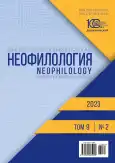On the issue of methodological, organizational and staffing for the needs of forensic linguistic expertise: traditional and current
- Authors: Zharkov I.V.1, Koltunova E.A.2
-
Affiliations:
- Guild of Linguistic Experts in Documentary and Information Disputes
- National Research Lobachevsky State University of Nizhny Novgorod
- Issue: Vol 9, No 2 (2023)
- Pages: 301-320
- Section: RUSSIAN LANGUAGE. LANGUAGES OF PEOPLES OF RUSSIA
- URL: https://journal-vniispk.ru/2587-6953/article/view/295705
- DOI: https://doi.org/10.20310/2587-6953-2023-9-2-301-320
- ID: 295705
Cite item
Full Text
Abstract
The actual problems of the organization and methodology of conducting forensic linguistic examinations are considered. The analysis was carried out taking into account the tasks set by the Government of the Russian Federation to improve the legislation governing forensic activities in Russia. Particular attention is paid to the modern trend of opposing state and non-state experts. It is noted that the redistribution of the workload between state and non-state forensic experts in favor of the former entails an increase in budget expenditures on material and organizational support for the activities of state forensic institutions and an increase in the time for producing expert opinions. A reasoned opinion is expressed about the inadmissibility of functioning in forensic linguistic examination of closed methods that are inaccessible to experts, specialists and participants in the trial. Attention is also paid to the methodological lacunae available in expert practice, which must be filled with expert techniques based on scientific verified linguistic methods, and the position is substantiated that closed methods prevent verification of the correctness of the application of one or another methodological position by an expert. In conclusion, the conclusion is drawn that the publicity of expert methodological materials makes them available for discussion in the scientific and expert community, which includes constructive criticism aimed at increasing the level of objectivity of expert linguistic and psycho-linguistic research.
About the authors
I. V. Zharkov
Guild of Linguistic Experts in Documentary and Information Disputes
Email: linguexpert@protonmail.com
ORCID iD: 0000-0003-4069-5938
PhD (Philology), Head of the Scientific and Methodological Department of the Guild (St. Petersburg)
Bldg 1, 11 Kibalchicha St., Moscow, 129164, Russian FederationE. A. Koltunova
National Research Lobachevsky State University of Nizhny Novgorod
Author for correspondence.
Email: koltunova52@yandex.ru
ORCID iD: 0000-0003-2601-7954
PhD (Philology), Associate Professor of Theoretical and Applied Linguistics Department of Philology and Journalism Institute
23 Gagarin Ave., Nizhny Novgorod, 603950, Russian FederationReferences
- Chernyavskaya M.S. Sudebno-ekspertnaya deyatel’nost’ negosudarstvennykh ekspertnykh organizatsii: teoreticheskie i prikladnye aspekty: avtoref. dis. … kand. yurid nauk. [Forensic activities of non-state expert organizations: theoretical and applied aspects: PhD (Law) diss. abstr.]. Moscow, Kutafin Moscow State Law University Publ., 2021, 19 p. (In Russ.) Available at: https://search.rsl.ru/ru/record/01010777413
- Kukushkina O.V., Safonova Yu.A., Sekerazh T.N. Teoreticheskie i metodicheskie osnovy sudebnoi psikhologo-lingvisticheskoi ekspertizy tekstov po delam, svyazannym s protivodeistviem ekstremizmu [Theoretical and Me-thodological Foundations of Forensic Psychological and Linguistic Examination of Texts in Cases Related to Countering Extremism]. Moscow, Federal Budgetary Entity Russian Federal Centre of Forensic Science of the Ministry of Justice of the Russian Federation Publ., 2011, 326 p. (In Russ.) https://elibrary.ru/qslvad
- Kukushkina O.V., Safonova Yu.A., Sekerazh T.N. Metodika provedeniya sudebnoi psikhologo-lingvisticheskoi ekspertizy materialov po delam, svyazannym s protivodeistviem ekstremizmu i terrorizmu [Methodology for Conducting Forensic Psychological and Linguistic Examination of Materials in Cases Related to Countering Extremism and Terrorism]. Moscow, Federal Budgetary Entity Russian Federal Centre of Forensic Science of the Ministry of Justice of the Russian Federation Publ., 2014, 98 p. (In Russ.) https://elibrary.ru/yolzbf
- Baranov A.N. Lingvisticheskaya ekspertiza teksta [Linguistic Examination of the Text]. Moscow, FLINTA-M, Nauka Publ., 2013, 591 p. (In Russ.) Available at: https://search.rsl.ru/ru/record/01006564760
- Novozhilova E.V., Donskova Yu.V. Requirements for scientific methods of forensic linguistics. Vestnik Nizhe-gorodskogo gosudarstvennogo universiteta im. N.I. Lobachevskogo. Seriya filologicheskaya = Vestnik of Loba-chevsky University of Nizhni Novgorod, 2022, no. 5, pp. 156-162. (In Russ.) https://doi.org/10.52452/19931778_2022_5_156, https://elibrary.ru/mfidip
- Baranov A.N. Linguistics in forensic linguistic expertise (method and truth). Vestnik VolGU. Seriya 2. Yazykoz-nanie = Science Journal of Volgograd State University. Linguistics, 2017, vol. 16, no. 2, pp. 18-27. (In Russ.) https://doi.org/10.15688/jvolsu2.2017.2.2, https://elibrary.ru/zaonen
- Gorbanevskii M.V. O prikladnoi lingvistike v bor'be s ekstremizmom [About applied linguistics in the fight against extremism]. Materialy Mezhdunarodnoi nauchnoi konferencii «Ekologiya yazyka i rechi» [Proceedings of the International Scientific Conference “Ecology of Language and Speech”]. Tambov, Publishing House of Derzhavin Tambov State University, 2012, pp. 235-249. (In Russ.) https://elibrary.ru/vcdhdx
- Kukushkina O.V. Methods used in forensic linguistic analysis. Teoriya i praktika sudebnoi ekspertizy = Theory and Practice of Forensic Science, 2016, no. 1 (41), pp. 118-126. (In Russ.) https://elibrary.ru/vroitp
- Galyashina E.I. Judicial linguistic expertise and limits of use of linguistic science methods. Vestnik Moskovskogo universiteta MVD Rossii = Vestnik of Moscow University of the Ministry of Internal Affairs of Russia, 2018, no. 4, pp. 31-36. (In Russ.) https://elibrary.ru/yjdetr
- Chernyshova T.V. Analitiko-ekspertnaya deyatel’nost’ filologa i problema vybora metoda v sovremennoi ling-voekspertnoi praktike [Analytical and expert activity of a philologist and the problem of choosing a method in modern linguoexpert practice]. Trudy Instituta lingvisticheskikh issledovanii RAN «Acta Linguistica Petropolitana» [Proceedings of the Institute for Linguistic Research Russian Academy of Science “Acta Linguistica Petropolitana”]. Saint Petersburg, Nauka Publ., 2016, pp. 335-350. (In Russ.) Available at: https://rusexpert.ru/public/guild/статья%20Т.В.Чернышовой.pdf
Supplementary files









